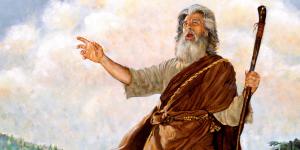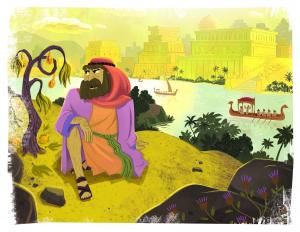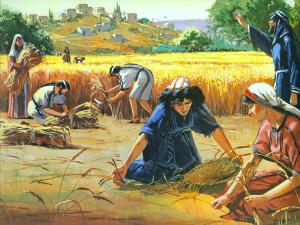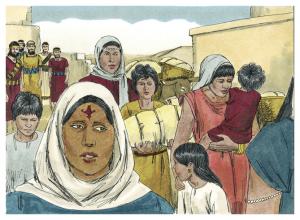
Holiness in a King David kind of religion doesn’t separate people from each other. David was able even to see holiness in his enemy King Saul as he twice refrained from killing him. Kings that followed David did not care about people of another economic or social status. God raised up prophets from among the people to express disgust for what was happening and for warnings that mostly went unheeded.
We call Jesus King and even King of Kings, but I don’t think Jesus would have found himself in the midst of royalty and affluence. The religion that went along with these kings was not the Jesus variety.
Episode 8 in Opening the Scriptures on the Way to Emmaus: Why Messiah had to Suffer. Introduction and links to other posts in the series here.
Growing inequality
There was, in fact, a great show of religion in all the succeeding reigns of the kings of Israel and Judah. Solomon built a magnificent temple to the Lord (and an even more magnificent palace for himself). As his kingdom grew in wealth, so did the extravagance of the sacrifices and other observances in the Lord’s name in the temple.
Solomon also sponsored the worship of all the gods of his many foreign wives. That was just good foreign relations, and Solomon’s foreign relations were very good. The royalty with its bureaucracy, the merchants, and the priests and other religious officials did very well. But who paid for all of this success? It was the common people through taxes and slave labor. There was not much identification except by rich with rich and poor with poor.
Prophets like Amos, Hosea, and Isaiah condemned the worship of foreign gods, but they had unkind words for the sacrifices to Israel’s God Yahweh as well. Amos was a poor farmer from the South, some time after Solomon’s death and the division of the kingdom into North and South, Israel and Judah. He prophesied against the fat cats of the Northern Kingdom with their winter homes and summer homes, precious ointments, and dining on lamb and calf.
Prophets cry: Nothing is holy.
I hate and despise your feasts; I take no pleasure in your solemn festivals. I reject your sacrifices. Let me hear no more of your chanting, but rather let justice flow like water and integrity like an unfailing stream. (Amos 5:21)
Injustice was rampant in the Southern Kingdom as well, and more prophets cried out. Here’s Hosea prophesying about the same time as Amos: (Ephraim is another name for the Northern Kingdom and Judah is the Southern Kingdom.)
What shall I do with you, O Ephraim? What shall I do with you, O Judah? Your love is like a morning cloud, like the dew that goes early away.… For I desire steadfast love and not sacrifice, the knowledge of God, rather than burnt offerings. (Hosea 6:4-6)
And Isaiah a little later:
What to me is the multitude of your sacrifices? … Bring no more vain offerings; … learn to do good; seek justice, correct oppression; defend the fatherless, plead for the widow.” (Isaiah 1:11, 13, 17)
The message of the prophets: If the “poor of Yahweh” are not holy enough for just treatment, then nothing is holy and no sacrifice can make anything holy.
Sacrifice stops
Eventually God gets what seems to be his wish, expressed in the words of the prophets. The Israelite sacrificial system came crashing down, first in the North and then in the South. In 722 BCE (Before the Common Era) Assyria destroyed the Northern Kingdom. A hundred years later the the Babylonian Empire replaced the Assyrian, and in 586 Babylon conquered Jerusalem and destroyed its temple. They stole anything of monetary value, including gold and silver vessels used for religious services. The elite of the people were forced to emigrate to Babylon. It was the Exile, or Babylonian Captivity.
With no land of their own and no Temple to unify religious practice, one would have expected the Jewish religion to disappear and the people to change allegiance to the more powerful gods of Babylon. All that was left of the physical apparatus of a once thriving religion was writing: words of prophets that had been set down on scrolls, prayers used at ceremonies in the Temple, court records, and some stories that were either community memories or interpretations of community experiences or a mixture of memory, exaggeration, story telling, and interpretation. Some of the scrolls had been rescued a century and a half previously from the destruction of the Northern Kingdom as some of its people fled to the South.
Around these and around new interpretations by prophets and priests trying to cope intellectually with tough circumstances, a new phase of the people’s religion developed. Synagogue worship, featuring a reading and an interpretation replaced sacrifices in the Temple. It was the ancestor of the first part of the Catholic Mass. Around this time the exiles from Judah began to be called Jews.
God’s mercy
God relented. The Jews and their religion survived. Here’s how God justifies letting his people off, spoken by either Hosea in hope or a later editor after the fact, that is, after the Exile ended:
How could I give you up, Ephraim, or deliver you up, Israel? … My heart is overwhelmed, my pity is stirred. I will not give vent to my blazing anger. (Hosea 11:8-9)
Jesus gives us an interpretation of this passage in parables like the Lost Coin and the Lost Sheep. There’s only rejoicing in the finding of the lost coin or sheep. Oddly, it costs the woman an exorbitant amount of energy, sweeping the whole house for one coin. For the shepherd there is tremendous risk in leaving 99 sheep behind. These are examples of Jesus’ weird story-telling art. But God is like that. One of the prophets in the Isaiah tradition, writing after the Exile, explains:
As a mother comforts her child, so I will comfort you; you shall be comforted in Jerusalem. (Isaiah 66:13)
It’s God who rescues the Jews. God acts like the mother who forgives simply because she has to be who she is. Israel has been brought low enough for God to call her beloved. Jesus would have identified with the poor of Israel throughout that people’s history. At this time, when the Jews are at their lowest, Jesus can see himself in the Jewish people as a whole.
The Nicene Creed says Jesus rose “according to the Scriptures.” Maybe Jesus saw in the resurrection of the Jewish people out of the depths of captivity a figure of his own resurrection. Maybe this was another of the stories that he told the two disciples on the way to Emmaus.
Image credit: JW.org via Google Images












